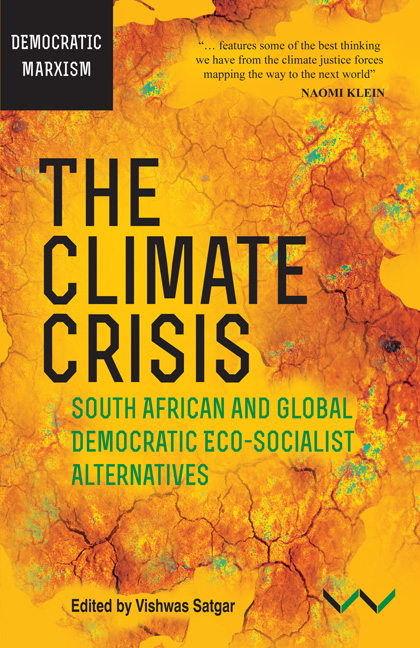Book contents
- Frontmatter
- Contents
- Tables and Box
- Acknowledgements
- Acronyms and Abbreviations
- Chapter 1 The Climate Crisis and Systemic Alternatives
- PART ONE THE CLIMATE CRISIS AS CAPITALIST CRISIS
- PART TWO DEMOCRATIC ECO-SOCIALIST ALTERNATIVES IN THE WORLD
- Chapter 4 The Employment Crisis, Just Transition and the Universal Basic Income Grant
- Chapter 5 The Rights of Mother Earth
- Chapter 6 Buen Vivir: An Alternative Perspective from the Peoples of the Global South to the Crisis of Capitalist Modernity
- Chapter 7 Challenging the Growth Paradigm: Marx, Buddha and the Pursuit of ‘Happiness’
- Chapter 8 Ubuntu and the Struggle for an African Eco-Socialist Alternative
- Chapter 9 The Climate Crisis and the Struggle for African Food Sovereignty
- PART THREE DEMOCRATIC ECO-SOCIALIST ALTERNATIVES IN SOUTH AFRICA
- CONCLUSION
- Contributors
- Index
Chapter 5 - The Rights of Mother Earth
from PART TWO - DEMOCRATIC ECO-SOCIALIST ALTERNATIVES IN THE WORLD
Published online by Cambridge University Press: 05 June 2019
- Frontmatter
- Contents
- Tables and Box
- Acknowledgements
- Acronyms and Abbreviations
- Chapter 1 The Climate Crisis and Systemic Alternatives
- PART ONE THE CLIMATE CRISIS AS CAPITALIST CRISIS
- PART TWO DEMOCRATIC ECO-SOCIALIST ALTERNATIVES IN THE WORLD
- Chapter 4 The Employment Crisis, Just Transition and the Universal Basic Income Grant
- Chapter 5 The Rights of Mother Earth
- Chapter 6 Buen Vivir: An Alternative Perspective from the Peoples of the Global South to the Crisis of Capitalist Modernity
- Chapter 7 Challenging the Growth Paradigm: Marx, Buddha and the Pursuit of ‘Happiness’
- Chapter 8 Ubuntu and the Struggle for an African Eco-Socialist Alternative
- Chapter 9 The Climate Crisis and the Struggle for African Food Sovereignty
- PART THREE DEMOCRATIC ECO-SOCIALIST ALTERNATIVES IN SOUTH AFRICA
- CONCLUSION
- Contributors
- Index
Summary
The universe is a communion of subjects, not a collection of objects. (Berry 2006: 17)
The ‘Rights of Mother Earth’ is a call to leave the dominant anthropocentric paradigm and to imagine a new Earth society. The anthropocentric viewpoint is that human beings are the central and most important entity in the world; that humans are superior to non-human life because they are the only ones that have consciousness, values and moral status. Within this perspective, nature is something separate from humans; it exists for the survival and development of human societies; it is the ‘environment’ of humans and a set of resources that can be exploited for their benefit. Anthropocentrism is deeply embedded in modern society. The logic of capital, which tends towards commodification and the development of technology, is deeply interconnected with anthropocentrism, augmenting the gap between humans and the Earth to levels never before seen in human history.
The Rights of Mother Earth challenges this vision and argues that in order to build alternative societies, we need to overcome anthropocentrism and change our relation with nature. The language of rights gives the concept a legal tone, but, as will be seen, the Rights of Mother Earth goes beyond the need for new legal frameworks that take nature into account. The legal recognition of the rights of nature/Mother Earth is just one stage in the process of construction that is still ongoing and that cannot be limited to juridical change. The final aim of the Rights of Mother Earth proposal is to build an Earth community: a society that has humans and nature as a whole.
The constitutionalisation in Ecuador and the legal recognition of the rights of nature/Mother Earth in Ecuador and Bolivia, in 2008 and 2010, respectively, reflect significant progress towards the realisation of the Rights of Mother Earth. But it is not the case that this proposal comes from the Andean region of South America. In reality, this alternative has diverse origins and different streams (indigenous, scientific, ethical and juridical) that developed at various moments and in different parts of the world. In some ways, several streams share common ideas and voices, while in others each presents a unique perspective. Nevertheless, these disparate voices have, over the years, interacted with one another, growing and deepening one another's ideas.
- Type
- Chapter
- Information
- Climate Crisis, TheSouth African and Global Democratic Eco-Socialist Alternatives, pp. 107 - 130Publisher: Wits University PressPrint publication year: 2018



